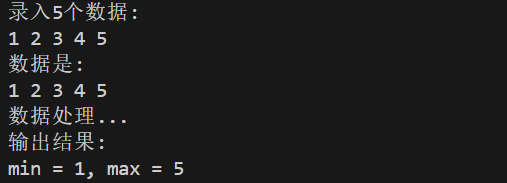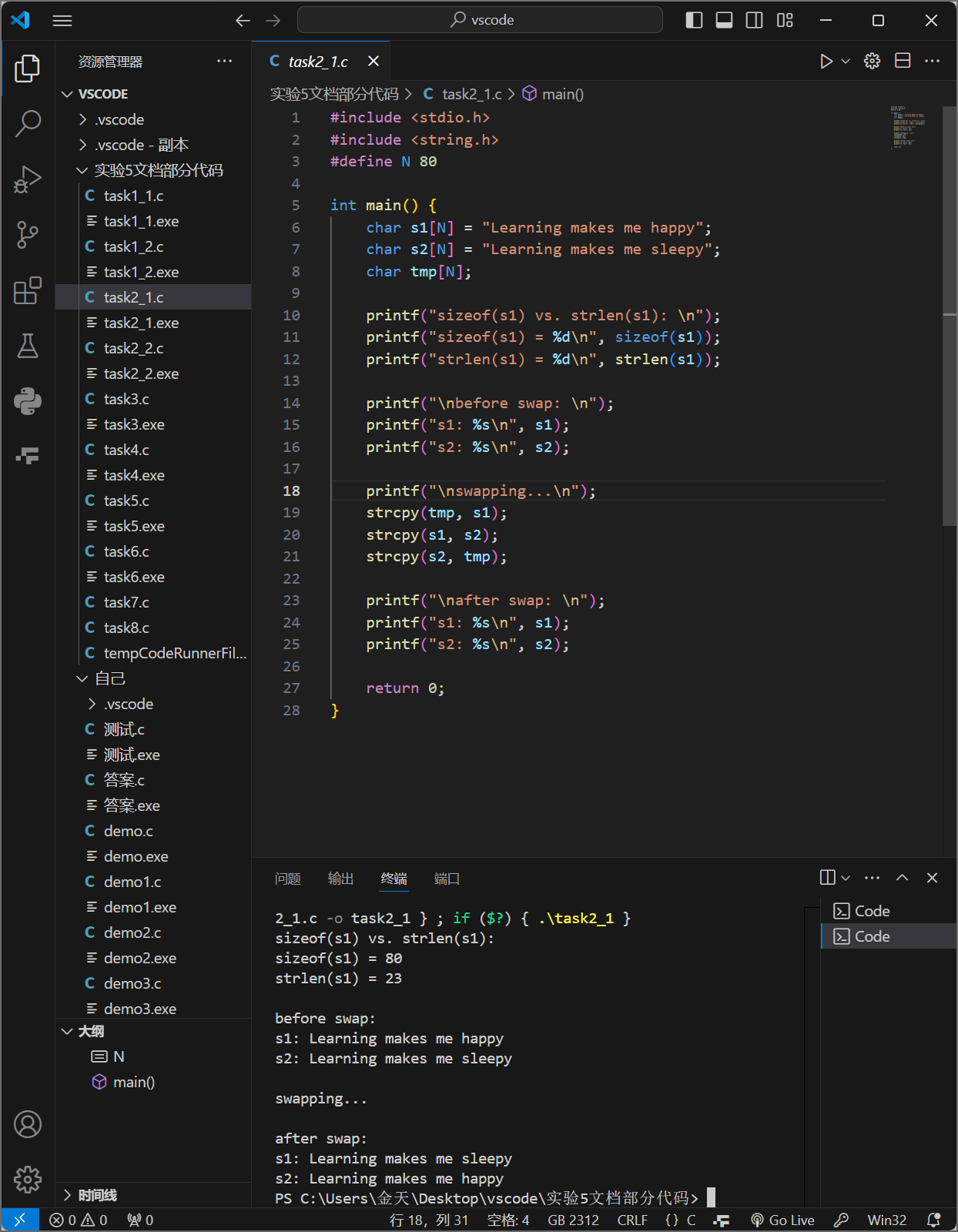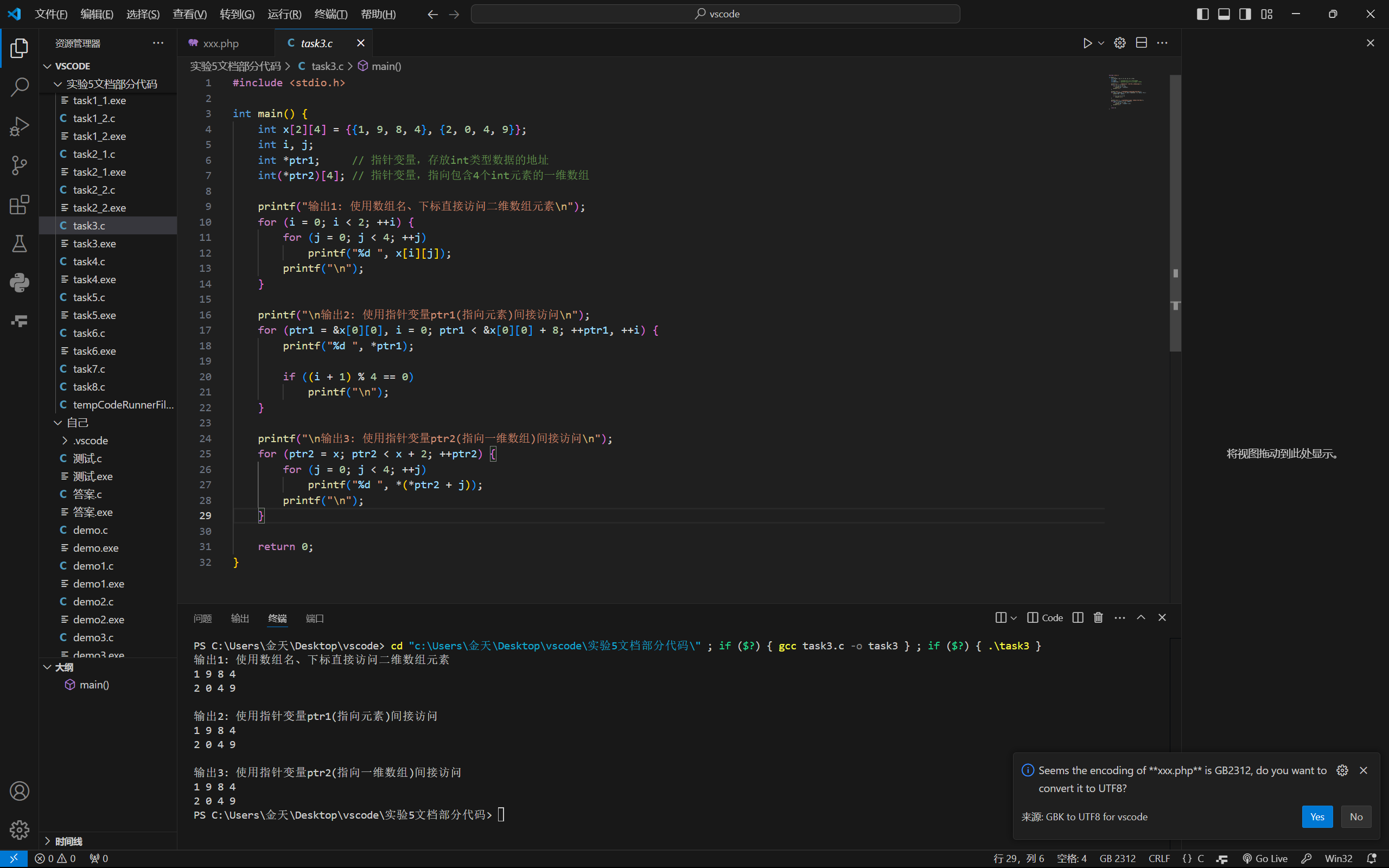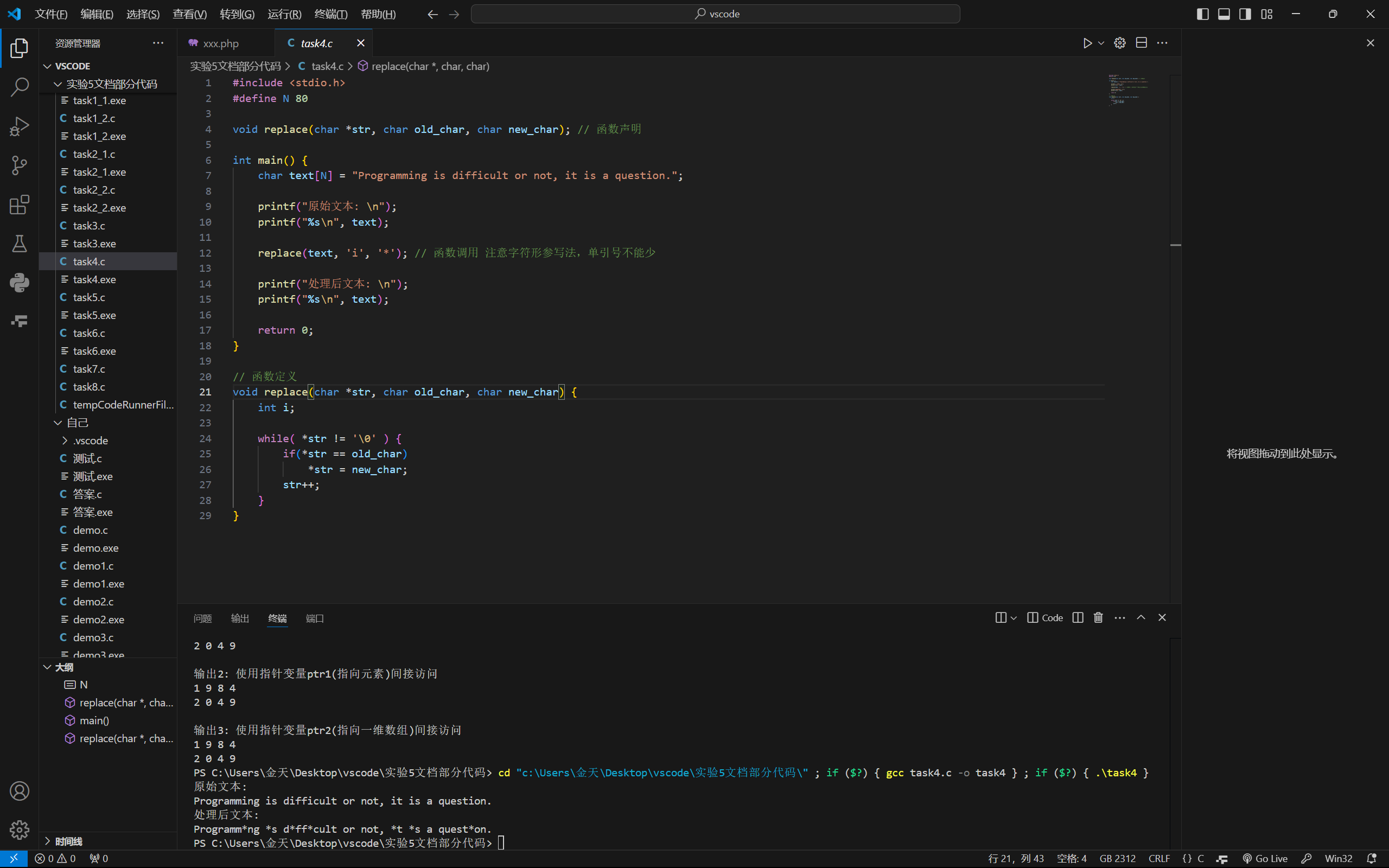实验5
task1_1.c
1 #include <stdio.h> 2 #define N 5 3 4 void input(int x[], int n); 5 void output(int x[], int n); 6 void find_min_max(int x[], int n, int *pmin, int *pmax); 7 8 int main() { 9 int a[N]; 10 int min, max; 11 12 printf("录入%d个数据:\n", N); 13 input(a, N); 14 15 printf("数据是: \n"); 16 output(a, N); 17 18 printf("数据处理...\n"); 19 find_min_max(a, N, &min, &max); 20 21 printf("输出结果:\n"); 22 printf("min = %d, max = %d\n", min, max); 23 24 return 0; 25 } 26 27 void input(int x[], int n) { 28 int i; 29 30 for(i = 0; i < n; ++i) 31 scanf("%d", &x[i]); 32 } 33 34 void output(int x[], int n) { 35 int i; 36 37 for(i = 0; i < n; ++i) 38 printf("%d ", x[i]); 39 printf("\n"); 40 } 41 42 void find_min_max(int x[], int n, int *pmin, int *pmax) { 43 int i; 44 45 *pmin = *pmax = x[0]; 46 47 for(i = 0; i < n; ++i) 48 if(x[i] < *pmin) 49 *pmin = x[i]; 50 else if(x[i] > *pmax) 51 *pmax = x[i]; 52 }

1.找到最大最小值
2.一个指向min,一个指向max
task1_2.c
1.找到最大值
2.可以。
task2_1.c

1.80,s1所占内存空间大小,s1字符个数
2.不能,字符串数组不能直接赋值输入
task2_2.c

1. s1中存放的是字符串,字符串s1占据的内存空间,s1中的字符数量
2.可以,之前的代码是字符串数组直接赋值,现在的代码是给s1赋值
3.交换的是s1,s2的地址,没有交换
task3.c

1.ptr是指针变量,指向包含4个int元素的一维数组
2.ptr是一个数组的名称
task4.c

1.把i替换为*
2.可以
task5.c
1 #include <stdio.h> 2 #define N 80 3 4 char *str_trunc(char *str, char x); 5 6 int main() { 7 char str[N]; 8 char ch; 9 10 while (printf("输入字符串: "), gets(str)!= NULL) { 11 printf("输入一个字符: "); 12 ch = getchar(); 13 14 // 读取输入字符后的换行符 15 getchar(); 16 17 printf("截断处理...\n"); 18 str_trunc(str, ch); // 函数调用 19 20 printf("截断处理后的字符串: %s\n\n", str); 21 } 22 23 return 0; 24 } 25 26 // 函数str_trunc定义 27 // 功能: 对字符串作截断处理,把指定字符自第一次出现及其后的字符全部删除, 并返回字符串地址 28 char *str_trunc(char *str, char x) { 29 char *p = str; 30 while (*p != '\0') { 31 if (*p == x) { 32 *p = '\0'; 33 break; 34 } 35 p++; 36 } 37 return str; 38 }

清空缓冲区
task6.c
1 #include <stdio.h> 2 #include <string.h> 3 #define N 5 4 5 int check_id(char *str); // 函数声明 6 7 int main() 8 { 9 char *pid[N] = {"31010120000721656X", 10 "3301061996X0203301", 11 "53010220051126571", 12 "510104199211197977", 13 "53010220051126133Y"}; 14 int i; 15 16 for (i = 0; i < N; ++i) 17 if (check_id(pid[i])) // 函数调用 18 printf("%s\tTrue\n", pid[i]); 19 else 20 printf("%s\tFalse\n", pid[i]); 21 22 return 0; 23 } 24 25 // 函数定义 26 // 功能: 检查指针str指向的身份证号码串形式上是否合法 27 // 形式合法,返回1,否则,返回0 28 int check_id(char *str) 29 { 30 int i, sum = 0; 31 char *p = str; 32 if (strlen(str) != 18) 33 return 0; 34 if (*p < '0' || *p > '9') 35 return 0; 36 for (i = 1; i < 17; ++i) 37 { 38 if (*++p < '0' || *p > '9') 39 return 0; 40 } 41 if (*++p != 'X' && (*p < '0' || *p > '9')) 42 return 0; 43 44 }

task7.c
1 #include <stdio.h> 2 #define N 80 3 void encoder(char *str, int n); // 函数声明 4 void decoder(char *str, int n); // 函数声明 5 6 int main() { 7 char words[N]; 8 int n; 9 10 printf("输入英文文本: "); 11 gets(words); 12 13 printf("输入n: "); 14 scanf("%d", &n); 15 16 printf("编码后的英文文本: "); 17 encoder(words, n); // 函数调用 18 printf("%s\n", words); 19 20 printf("对编码后的英文文本解码: "); 21 decoder(words, n); // 函数调用 22 printf("%s\n", words); 23 24 return 0; 25 } 26 27 /*函数定义 28 功能:对s指向的字符串进行编码处理 29 编码规则: 30 对于a~z或A~Z之间的字母字符,用其后第n个字符替换; 其它非字母字符,保持不变 31 */ 32 void encoder(char *str, int n) { 33 int i; 34 for(i=0;str[i]!='\0';i++){ 35 if(str[i]>='a'&&str[i]<='z'){ 36 str[i]=(str[i]-'a'+n)%26+'a'; 37 } 38 else if(str[i]>='A'&&str[i]<='Z'){ 39 str[i]=(str[i]-'A'+n)%26+'A'; 40 } 41 } 42 43 } 44 45 /*函数定义 46 功能:对s指向的字符串进行解码处理 47 解码规则: 48 对于a~z或A~Z之间的字母字符,用其前面第n个字符替换; 其它非字母字符,保持不变 49 */ 50 void decoder(char *str, int n) { 51 int i; 52 for(i=0;str[i]!='\0';i++){ 53 if(str[i]>='a'&&str[i]<='z'){ 54 str[i]=(str[i]-'a'-n+26)%26+'a'; 55 } 56 else if(str[i]>='A'&&str[i]<='Z'){ 57 str[i]=(str[i]-'A'-n+26)%26+'A'; 58 } 59 } 60 }

task8.c
1 #include <stdio.h> 2 #include <string.h> 3 int main(int argc, char *argv[]) { 4 int i,j; 5 char* temp; 6 for(i = 1; i < argc; i++){ 7 for(j=1;j<argc-i;j++){ 8 if(strcmp(argv[j],argv[j+1])>0){ 9 temp = argv[j]; 10 argv[j] = argv[j+1]; 11 argv[j+1] = temp; 12 } 13 14 } 15 } 16 17 for(i = 1; i < argc; ++i) 18 printf("hello, %s\n", argv[i]); 19 20 return 0; 21 }





